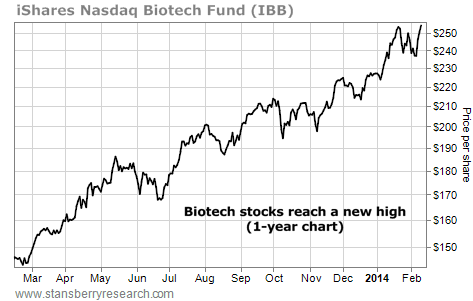| Home | About Us | Resources | Archive | Free Reports | Market Window |
How to Avoid the Investment Trap That "Duped" Warren BuffettBy
Thursday, February 13, 2014
It was the biggest mistake of Warren Buffett's career...
Yesterday, I shared how for the first time in his career, Warren Buffett will have to announce that Berkshire's book value did not increase faster than the S&P 500 over the last five years. And it all stems from a large, ill-advised investment in ConocoPhillips back in 2008.
In the last essay, we told you why this was such poor timing... and how this large purchase seemed to defy many of Buffett's long-held investment principles...
So WHY did Buffett make such a business his largest-ever commitment to a publicly traded stock? And why... why... would he ignore the inevitable commodity price cycle and continue to buy an oil company even as petroleum prices soared?
I think I know...
I believe that for the first and only time in his career, Buffett got caught up in an investment mania – the "Peak Oil" bubble.
Besides the totally out-of-character moves Buffett made buying ConocoPhillips (chasing the price way higher), Buffett made a number of public statements that indicated he believed in the theory of Peak Oil – which argued that petroleum production had entered an inevitable and irreversible decline.
For example, on CNBC in early 2008, Buffett was specifically asked why oil prices were soaring. Here's what he said on live television:
Another clue: During the 2009 annual meeting of Wesco (the small holding company that was run by Buffett's business partner, Charlie Munger, and is now fully integrated into Berkshire), Munger spoke at length about Peak Oil. "Whether the peak is five years from now or last year I don't know, but we are somewhere near peak oil production," he said. "Oil, I think, will get more and more expensive." These comments were similar to ones Munger made before. For example, during a mid-2000s conference with Chinese business leaders, he said:
Looking at these comments and what happened with the stock, Buffett and Munger clearly believed in Peak Oil. They thought the world was literally running out of oil. That's the only explanation for Buffett's ConocoPhillips investment. The losses he took on this investment are the real reason Buffett isn't going to beat the S&P 500 over the most recent five-year period – his self-imposed key management goal. There's a huge lesson here for investors. Rick Rule, who has spent his entire career invested in commodities, says that in commodities, "You're either a contrarian or a victim." As a long-term investor, you almost never make money chasing commodity prices higher. Instead, to buy commodities (and commodity stocks) safely, you should always wait until their prices have collapsed.
Another of Rule's key laws to success in commodities is to remember that markets work. Sooner or later, higher prices will create new supplies. Extremely high prices – record-high prices – will create record new supplies.
And to the surprise of the disciples of 19th-century economist Thomas Malthus... it turned out that we aren't really out of oil at all. Nope. Instead, record cash flows from oilfields enabled huge investments in new technologies, like horizontal drilling. Those technologies unlocked new supplies of oil that dwarfed all previous discoveries combined.
Today, just five years later, the U.S. government is taking steps to allow our trading partners to tap our oilfields. These moves will strengthen the U.S. dollar and generate massive trading profits and hundreds of billions of dollars in new revenue in taxes and royalties for the government.
Two important takeaways from Buffett's biggest-ever mistake: Never, ever get caught up in any kind of Malthusian, limited-supply investment story. Don't forget: Markets work. As prices move higher, new supplies are bound to be discovered and flood the market. It's only a matter of time.
And finally, never chase commodity prices higher. Always wait until they've fallen 80% or more to make a major commitment.
Regards,
Further Reading:
"I believe historians will look back and marvel at how we could imagine the world would run out of oil," Porter writes. "And the incredible mania that thinking produced in the oil markets in the mid-2000s." Porter says having a correct understanding of these issues is critical... perhaps the single most important economic issue of the next several decades. Learn more here: A Simple, Perfect Lie for Politicians.
Before you invest in any commodity, make sure to read this interview with Rick Rule. Rick reveals how to master the giant cycles in natural resources... and make life-changing profits.
Market NotesTHE BIOTECH RALLY IS STILL ON... Despite the broad market's rough January, the world's biggest "stealth" bull market just reached a new yearly high.
Regular readers know we see the biotech sector as one of the market's biggest "boom and bust" areas. Folks love the idea of investing in the next blockbuster drug, the next great cancer drug, or the next "miracle pill." This draws in speculative money flows.
Although you don't see it on the cover of mainstream magazines, biotech is booming. Many of the big biotech companies are generating solid earnings growth. Speculative money is flowing into the sector. We've highlighted this "stealth" bull market many times over the past 18 months.
You can see this bull market at work in the chart below. It shows the past year's trading in the iShares Biotech Fund (IBB). As you can see, this fund has climbed from 150 to 254 in just the past year (69%). This week, it struck a new high. The biotech rally is still on...
 |
Recent Articles
|


